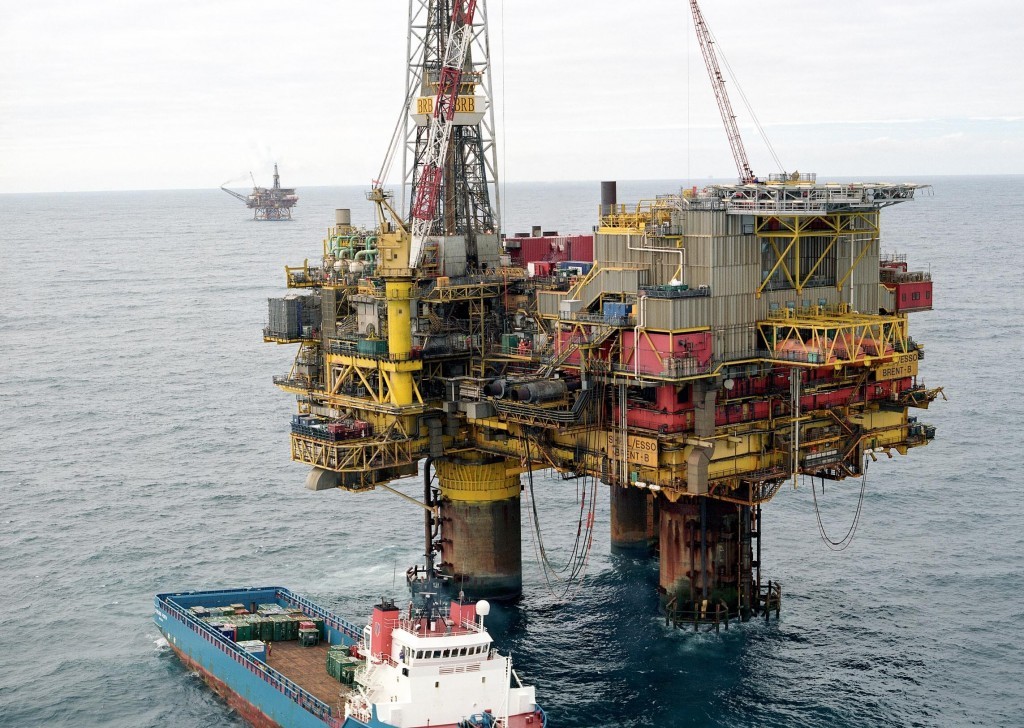
Oil giant Shell was today fined over £6,000 after a diesel leak on board the same North Sea platform where two workers died 12 years ago.
Sean McCue, 22, and Keith Moncrieff, 45, lost their lives when they were overcome by gas while working on the energy firm’s Brent Bravo rig in 2003.
The oil company was previously fined nearly one million pounds admitting safety breaches which led to their deaths.
Yesterday Shell UK bosses returned to the court after approximately 13 to 15 tonnes of diesel spilled into the North Sea despite warnings over the transfer system going back over a decade.
Senior management from the Royal Dutch Shell subsidiary appeared in the public benches at Aberdeen Sheriff Court where the company pleaded guilty to an unlicensed release of fuel.
The leak took place in May 2013 while the Brent Bravo platform, which sits 116 miles north east of Lerwick, Shetland, underwent a scheduled shut-down for routine maintenance.
An offshore supply vessel was carrying out ‘bunkering’ operations – using bulk hoses which are lowered from the platform to allow the transfer of diesel – when the leak was spotted on one of the flexible pipes.
Just before starting the transfer at about 1am on May 11, 2013, the crews carried out inspections of the hoses but only noticed general “wear and tear”.
But around an hour later the chief officer of the supply vessel noticed a “discolouration” in the sea water indicating a leak.
The Crown narrative lodged in court yesterday stated: “He saw a plume emanating from the diesel bunkering hose which was mushroom shaped and approximately 15-20 metres in length from the hose.
“He immediately instructed his crew to stop the diesel pump and contacted the Brent Bravo to advise them of the leak.
“The deck crew began pulling the diesel hose back to the installation and at that time diesel could be seen escaping from the hose.”
The court heard that pumping activities were immediately stopped and the relevant authorities informed.
Department of Energy and Climate Change (DECC) investigators found two damaged sections of hose, which had not be fully inspected before starting operations due to the way the bunkering station was set-up.
They found “hand-sized” damage on the hoses and also discovered they were “bulging and deformed in places”.
The Crown narrative added: “In DECC’s opinion, the defective areas of hose could not have been missed had there been an adequate visual inspection of the hose prior to the bunkering operation.”
Prosecutors said that concerns had first been raised about the bunkering stations, where the hoses were stored, nine years earlier.
And just three months earlier in 2013 the DECC had identified problems with bunkering hoses on the Brent Bravo after inspectors found kinked hoses. Shell was ordered to carry out a review at that time.
The Crown narrative said: “There were well communicated concerns regarding the bunkering stations across the Brent Field Installations operated by Shell.
“Concerns regarding the hose storage arrangements on the Brent Bravo were first raised in 2004 by a Shell employee.”
The court heard that Shell had since implemented a number of measures to prevent similar future incidents, including investing in a customised hosereel system.
Representing Shell, solicitor advocate Ian Woodward-Nutt said the incident amounted to a “failing of the company”. The firm admitted a breach under the Offshore Petroleum Activities (Oil Pollution Prevention and Control) Regulations 2005 in court yesterday.
He added: “It is accepted that the inspections of the hose were inadequate.
“That was not known to the relevant decision makers within the company.”
Sheriff Kenneth Stewart fined the company 6,650 pounds, reduced from the maximum imposable fine of 10,000 pounds due to the early stage of plea.
The court heard that the company had one analogous conviction under the Prevention of Oil Pollution Act 1971 due to an incident which happened on May 12, 2003.
A Shell UK spokeswoman said: “We regret that the release occurred – no spill is acceptable.
“We have since carried out a thorough investigation into the incident and have shared the lessons learned across the business.”
Recommended for you
